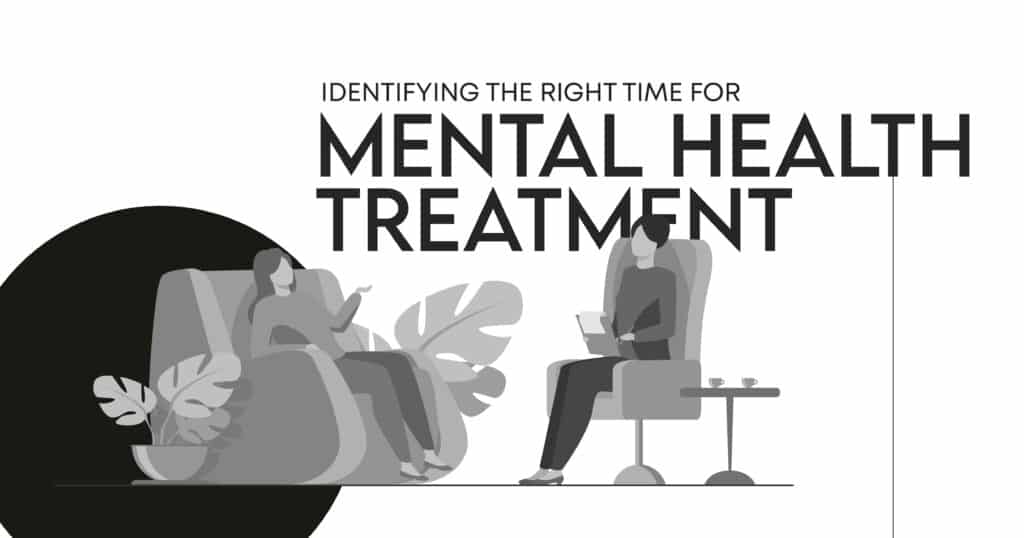Knowing when to seek mental health treatment can be challenging. Mental health challenges often develop gradually, making it hard to recognize when normal stress or sadness becomes something more serious.
Delaying treatment, however, can worsen symptoms, affect relationships, and disrupt daily life. By understanding the signs, knowing your options, and taking proactive steps, you can address concerns before they become overwhelming.
Identifying Mental Health Symptoms and When to Take Action
Recognizing mental health symptoms early is crucial for effective intervention. These symptoms can be emotional, behavioral, or physical, and they often appear subtly before becoming disruptive.
Persistent sadness, unexplained irritability, lack of energy, and difficulty concentrating are common warning signs. Physical changes like disrupted sleep patterns, appetite fluctuations, or frequent headaches can also point to deeper mental health concerns.
It’s important to act when these symptoms persist for more than a couple of weeks or when they interfere with your ability to work, maintain relationships, or enjoy life.
According to the National Institute of Mental Health (NIMH), early treatment often leads to better recovery outcomes, preventing symptoms from escalating into a mental health crisis.
Nashville Mental Health
Signs of Mental Illness That Require Attention
Some signs of mental illness are clear indicators that it’s time to seek professional support. These may include:
- Intense mood swings that affect relationships.
- Paranoia or hallucinations.
- Self-harming behaviors or suicidal thoughts.
- Extreme withdrawal from friends and family.
- Sudden inability to handle daily responsibilities.
These red flags require prompt action because they often signal conditions like severe depression, bipolar disorder, or schizophrenia. Ignoring them increases the risk of harm and prolongs recovery. If you or someone you know exhibits these signs, contact a mental health professional or a crisis helpline immediately.
Understanding Emotional Distress and Its Impact
Emotional distress is more than feeling stressed or upset—it’s a prolonged state of emotional suffering that can affect both mental and physical health. It might manifest as persistent anxiety, a constant sense of dread, or feelings of hopelessness. Chronic emotional distress can impair judgment, reduce resilience, and even weaken the immune system.
In the workplace, it may lead to burnout and absenteeism. In relationships, it can cause misunderstandings and emotional disconnection. Over time, untreated emotional distress can contribute to serious conditions such as major depression or generalized anxiety disorder. Recognizing this impact early and taking steps toward mental wellness can prevent escalation and help you regain balance.

Available Therapy Options for Mental Health Support
When considering therapy options for mental health support, there is no one-size-fits-all approach. The right type of therapy depends on your symptoms, personal preferences, and treatment goals. Here’s a quick comparison:
| Therapy Type | Focus Area | Best For |
| Cognitive Behavioral Therapy (CBT) | Identifying and changing negative thought patterns | Anxiety, depression, phobias |
| Dialectical Behavior Therapy (DBT) | Emotional regulation and mindfulness | Borderline personality disorder, self-harm behaviors |
| Psychodynamic Therapy | Exploring past experiences and unconscious patterns | Long-term personality issues, unresolved trauma |
| Group Therapy | Peer support and shared experiences | Social anxiety, addiction recovery |
| Family Therapy | Improving family communication and relationships | Conflict resolution, supporting loved ones with mental illness |
Each approach offers unique benefits, and sometimes a combination of therapies produces the best outcomes. Discussing your symptoms with a professional can help determine the best match.
The Importance of Seeking Professional Help
Seeking professional help is not a sign of weakness—it’s a step toward reclaiming control of your life. Mental health professionals, including therapists, psychiatrists, and counselors, can provide accurate diagnoses, evidence-based treatment, and ongoing support. They can also help you navigate challenging periods, offering tools to manage stress and regulate emotions.
Early intervention often prevents the development of more severe symptoms. For example, someone experiencing mild anxiety can learn coping strategies before it progresses into a panic disorder. Mental health care should be viewed as physical health care, addressing issues early, and the recovery process should typically be smoother and faster.
For more guidance on recognizing when it’s time to seek help, the National Alliance on Mental Illness (NAMI) offers a helpful resource on Getting Treatment During a Crisis.
Nashville Mental Health
Preparing for a Psychiatric Evaluation
A psychiatric evaluation is a comprehensive assessment used to diagnose mental health conditions and develop a treatment plan. Preparing for one involves being honest about your symptoms, medical history, and lifestyle. Keep track of when your symptoms began, how they have changed, and what factors make them better or worse.
Bring a list of any medications or supplements you are taking, and be ready to discuss your family’s mental health history. This transparency helps the clinician make an accurate diagnosis and tailor therapy or medication plans to your needs. Remember, evaluations are collaborative, and your input is essential.
Responding to a Mental Health Crisis Effectively
When faced with a mental health crisis, quick and informed action can save lives. This might involve calling 988 in the U.S., contacting a crisis counselor, or taking a loved one to the nearest emergency facility.
Steps to respond effectively:
- Stay calm and ensure safety.
- Listen without judgment and avoid giving unsolicited advice.
- Contact emergency services or a crisis helpline if there’s an immediate risk.
- Offer to stay with the person until help arrives.
A crisis can be overwhelming, but prompt intervention ensures the person receives the help they need before the situation escalates further.
Promoting Mental Wellness in Everyday Life
Promoting mental wellness isn’t only about responding to challenges—it’s about prevention. Regular physical activity, a balanced diet, adequate sleep, and maintaining social connections are all key to long-term emotional health. Mindfulness practices such as meditation or journaling can also enhance self-awareness and reduce stress.
Creating healthy boundaries, limiting screen time, and prioritizing hobbies you enjoy are small but powerful steps that protect your mental health. These habits build resilience, making coping easier when life throws challenges your way.
Take the First Step Toward Mental Wellness With Support From Nashville Mental Health
If you’re wondering when to seek mental health treatment, the answer is often sooner than you think. Whether you’re experiencing persistent mental health symptoms, going through a period of intense emotional distress, or navigating a mental health crisis, Nashville Mental Health offers compassionate, evidence-based care to help you heal.
Our team provides tailored therapy options, comprehensive evaluations, and supportive programs designed to meet you where you are. Don’t wait until symptoms worsen, reach out today and take the first step toward lasting mental wellness. Contact Nashville Mental Health to begin your journey to better mental health.

Nashville Mental Health
FAQs
- What are the common mental health symptoms that indicate it’s time to seek treatment?
Persistent sadness, anxiety, mood swings, and changes in sleep or appetite that interfere with daily life are signs you should seek help.
- How can one recognize the signs of mental illness that require professional attention?
Look for extreme mood changes, withdrawal from loved ones, self-harm thoughts, or loss of the ability to function normally.
- What types of therapy options are available for someone experiencing emotional distress?
Options include CBT, DBT, psychodynamic therapy, group therapy, and family therapy, depending on your needs.
- When should you consider a psychiatric evaluation during a mental health crisis?
If symptoms are severe, involve suicidal thoughts, or prevent daily functioning, an evaluation is necessary.
- How can promoting mental wellness in daily life help prevent the need for mental health treatment?
Healthy routines, stress management, and strong social connections build resilience and can reduce the risk of serious issues.





